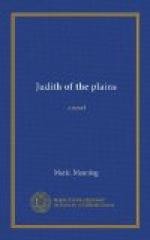“Whin the carpse died hard, and th’ wake was a success.” Costigan turned over. “Werra, werra, but we’ll be seein’ fairies the night!”
A “XXX” man turned his head with a deliberate slowness and regarded Peter with narrowing eyes: “If the subject of cattle-thieves and their punishment is unpleasant to the gentleman from New York, perhaps he will favor us with something more cheerful.” It was the same man who had given the two definitions of the “H L” brand that morning at the round-up.
“Delighted,” said Peter, affecting not to notice the significance of the man’s remark. “Did you ever hear of the time that Tony Neville was burned with snow?”
The “XXX” man yawned long and audibly. No one seemed especially interested in Tony Neville’s having been burned with snow, but Peter struck out manfully, just in time to head off a man who said that he had seen Jim Rodney or some one who looked like him, following the trail-herd.
“Once on a time, when it paid to be a cattle-man,” began Peter, “there was an outfit near Laramie that hailed from the United Kingdom, every mother’s son of them. A fine, manly lot of fellows, but wedded to calamity along of their cooks—not the revered range article,” and Peter waved his hand towards the “W-square” cook, who was one of the party, “but the pampered ranch article that boasts a real stove, planted in a real kitchen, the spoiled darling that never has to light a fire out of wet wood in the rain.
“These unhappy Britons had every species of ill luck that could befall an outfit, in the way of cooks; they were of every nationality, age, and sex, and they stole, drank, quarrelled, till the outfit determined to sweep the house clear of them and do its own cooking. Every man was to have a turn at it for a week. There was a Scotchman, who gave them something called ‘pease bannocks,’ three times a day; followed by an Irishman, who breakfasted them on potatoes and whiskey. There was an Englishman, who had a beef slaughtered every time he fancied a tenderloin. There was a Welshman, who sang as he cooked. There were as many different kinds of indigestion as there were men in the outfit. They would beg to do night-herding, anything to get them away from that ranch. Finally, when their little tummies got so bad that their overcoats thickened, or wore through, or whatever happens to stomachs’ overcoats that are treated unkindly, some one’s maiden aunt sent him a tract saying that rice was the salvation of the human race, as witness the Chinese. Whosever turn it was to cook that week determined to try the old lady’s prescription. Rice was procured, about a peck, I think; and the man who was cooking, pro tem, put the entire quantity on to boil in a huge ham-boiler, over a slow fire, as per the directions of the maiden aunt. The rice seemed to be doing nicely, when some one came in and said that a bunch of antelope was over on the hills and there was a good chance to get a couple. Every man got his gun, all but the cook, and he looked at the rice, that hadn’t done a thing over the slow fire, in a way that would melt your heart. ’Just my luck that it should be my week to pot-wrestle when there’s good hunting right at one’s front door.’




